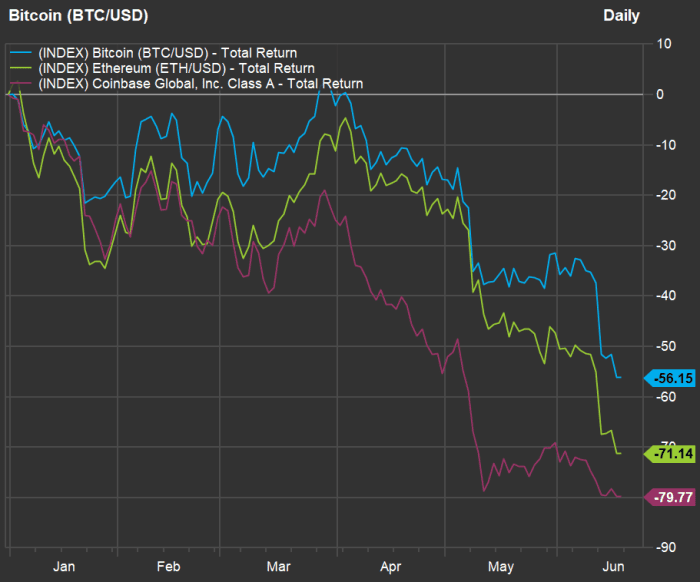The S&P 500 index plunged 23.6% from its closing high on Jan. 4 through June 16. The damage have been broad — on June 16, 97% of stocks in the benchmark index were down, with more than a third dropping at least 5%.
A bear market is no fun to wait through, but the U.S. stock market DJIA, -0.59% has always recovered from this type of decline. From a then-closing-record on Feb. 19, 2020, the S&P SPX, -0.48% collapsed 34% through March 23, 2020, but by Aug. 18, 2020, new records were being set as investors’ fears were eased by monetary and fiscal stimulus to fight COVID-19. This time around, investors may have longer to wait because of the uncertainty over whether the Federal Reserve’s policy moves to fight inflation will lead to a recession.
Mark Hulbert looks at the history of bear markets back to 1990, and one of his conclusions may surprise you in a good way.
More from Hulbert about this bear market:
Advice for navigating the bear market
MarketWatch photo illustration/iStockphoto
Michael Sincere talks to an investor with 70 years of experience who shares four strategies he has used to ride through bear markets.
Isabel Wang shares advice from two strategists on what investors should do during a bear market.
Lawrence McMillan warns options traders not to be fooled by bear-market rallies.
Michael Brush weighs in with seven reasons the beleaguered biotech sector is now a “buy”.
For investors worried about their retirement accounts, Brett Arends shares lessons learned through myriad financial crises over the past 25 years.
A cooling housing market
Mortgage-loan interest rates have nearly doubled this year. Quentin Fottrell explains the effects on home buyers and talks to industry insiders about how the housing market is likely to change.
Aarthi Swaminathan digs into areas in Utah that boomed as new residents fled more expensive housing markets. Here’s what those markets look like now..
More housing coverage:
The Crypto bears

FactSet
This chart shows this year’s declines for bitcoin BTCUSD, -0.78%, Ethereum ETHE, -3.87% and Coinbase COIN, -2.31%, the crypto exchange which this week said it would cut 18% of its workforce.
One brutal side effect of the slide in cryptocurrency prices was the action by Celsius Networks, a crypto lender, to halt withdrawals by account holders who had made cash deposits. Here’s a look at related problems spreading through the crypto industry.
Frances Yue digs into the the metrics of the crisis for virtual currencies in this week’s edition of her Distributed Ledger column.
More coverage of the fallout from bitcoin’s slide:
Inflation and the Federal Reserve
On June 15 the Federal Reserve raised the target range for the federal funds rate by 0.75% to a target range of 1.5% to 1.75%, as part of an effort to cool inflation. This was the largest increase in the federal funds rate in three decades.
Greg Robb shares four takeaways from Federal Reserve Chairman Jerome Powell’s press conference that followed the central bank’s policy announcement.
Rex Nutting believes the Fed’s analysis of the economy is incorrect and that the economy is actually slowing already.
Andrew Keshner shares three financial moves that can help you during a period of rising interest rates.
Related coverage:
Inflation and retirement
Should high inflation change your retirement plans? Maybe — here are numbers to run now.
More retirement and planning coverage:
- No matter the income bracket, LGBTQ investors are less confident about retirement than their non-LGBTQ peers
- 8 money lessons for the class of 2022
Pride, politics and money

MarketWatch photo illustration/iStockphoto
One easy way for companies to celebrate their virtues is by participating in Pride Month. But some of the same companies patting themselves on the back have been slippery — helping fund campaigns of politicians who have supported anti-LGBTQ legislation, as Ciara Linnane reports.
Another problem in a world of supply shortages
Cargo thieves loaded up during the pandemic. Here are the items they most like to steal, as Claudia Assis explains.
The “Great Resignation” may be over

MarketWatch photo illustration/iStockphoto
The seller’s market for labor may be at an end for U.S. tech companies, as investment money dries up, Jon Swartz reports.
Want more from MarketWatch? Sign up for this and other newsletters, and get the latest news, personal finance and investing advice.

